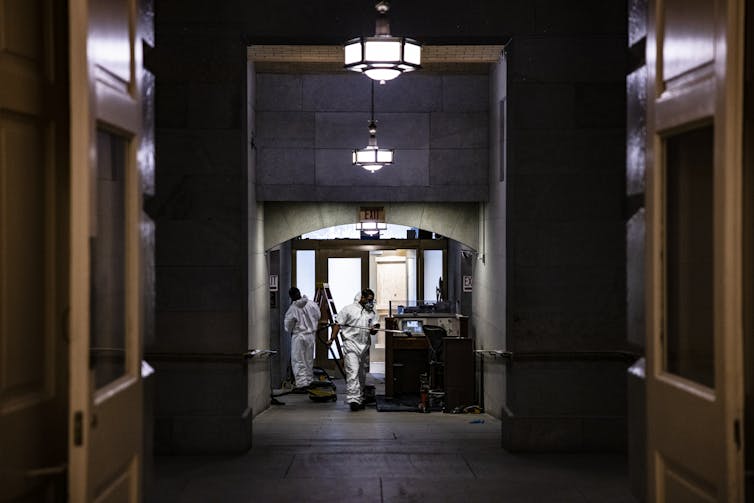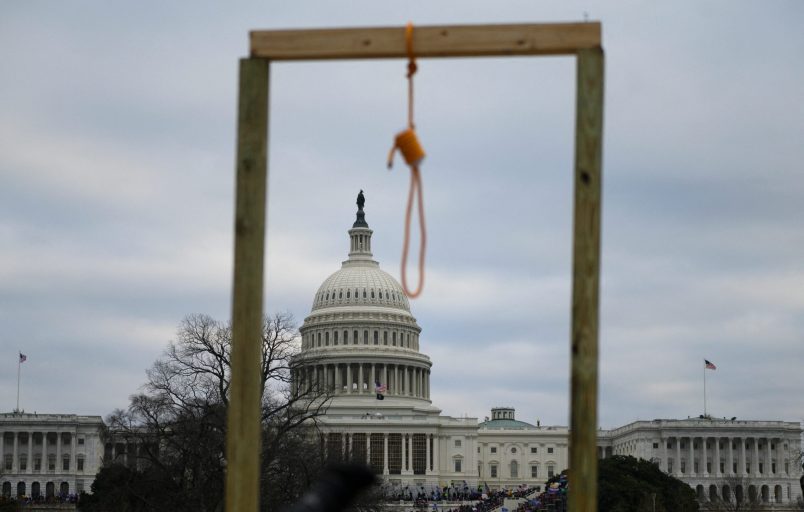This article is part of TPM Cafe, TPM’s home for opinion and news analysis. It first appeared at The Conversation.
An attendee at an October 2021 political rally hosted by right-wing activist Charlie Kirk asked: “How many elections are they going to steal before we kill these people?”
The attendee was referring to the baseless allegation that Joe Biden stole the 2020 U.S. presidential election and that he unfairly denied Donald Trump reelection.
Kirk, CEO of Turning Point USA, condemned the question. But one year after the Capitol insurrection that was fueled by Trump’s claims of a rigged election, Kirk, other commentators and politicians – and, of course, Trump himself – continue to fuel false beliefs of widespread election fraud. Embrace of the “Big Lie” that Trump really won the election has become an article of faith for many Republican politicians. It is also widely believed by conservative Americans; in an October, 2021 poll, 60% of Republicans said the 2020 presidential election results should definitely or probably be overturned.
This creates a potentially dangerous situation for the United States. Acceptance of electoral defeat, something political scientists call “loser’s consent,” is essential for stability and order in democracies.

‘Sore losers’ can drive terrorism
Democracy is based on a compact: Election losers agree to accept the results and encourage their supporters to do the same.
In exchange, losing politicians get a chance to run, and win, in a future election.
However, loser’s consent is fragile. And when it is broken the risk of political violence increases. In a recent study I published, I conclude that when election losers in democracies reject election results, becoming “sore losers,” trust in political institutions is eroded, political polarization and tribalism grows and mistrust thrives.
This produces a situation where political violence is no longer seen as taboo, particularly among supporters of the losing political party. My research shows that when losing politicians in democracies refuse to accept election results, citizens begin to see terrorism as more acceptable and domestic terrorism increases.
Here in the U.S., outrage over the Big Lie helped fuel the violence at the Capitol on Jan. 6, 2021. It has also driven domestic terrorism plots.
For example, federal authorities announced charges in July against two men who planned to bomb the California Democratic Party headquarters. The two men were radicalized by the Big Lie and expressed hope on social media that the attack would “start a movement that could keep former President Donald J. Trump in office.”

Understanding the data
In my study I examined domestic terrorist attack data in over 100 democracies from 1970 to 2018. I also looked at public opinion on whether people view the use of terrorism as justifiable in 30 democratic countries from 2017 to 2020. I based my definition of domestic terrorism on the one used by the Global Terrorism Database. Finally, I used data to measure whether politicians who lost recent national elections in democracies refused to accept the results. I limited my analysis to democracies that were free from electoral irregularities.
I also accounted for other factors that might make domestic terrorism more common or acceptable in my analyses. These include the country’s economic state, ethnic diversity and political violence history, as well as the government’s strength and stability.
For public opinion on terrorism, I weighed the effects of factors such as the age, gender, income, education level, political ideology and religious and ethnic identity of the survey respondent and the amount of terrorism in the country over the previous three years.
When contested results lead to violence
Here is what I found.
First, when losing political parties in democracies reject election results, domestic terrorism increases and gets more intense. By how much depends on how many, and what types of, political parties were sore losers.
Countries where all political parties, including the losers, accepted the election results experienced only one domestic attack about every two years. However, countries where one of the main political parties lost the election but refused to accept the official results – the situation most like what the U.S. currently faces – subsequently experienced around five domestic terrorist attacks per year. Finally, countries where all losing political parties rejected the election results subsequently experienced more than 10 domestic terrorist attacks per year.
Second, the sore-loser effect also boosts acceptance of terrorism. Only around 9% of citizens of democracies where all losing parties accepted election results regard terrorism as justifiable behavior. This percentage increased to around 27% in democracies where the main, losing opposition party or parties rejected the election – the category most approximating the United States after the 2020 election. Finally, around a third of citizens in democracies where all losing parties rejected election results also tolerated terrorism as a tactic.
These results show that when politicians refuse to accept a free and fair democratic election’s outcome, and instead choose to promote a popular narrative of a stolen or dirty election, they place their people in physical danger. Popular tolerance for terrorism grows, and so does terrorist activity itself.
James Piazza is a liberal arts professor of political science at Penn State.
This article is republished from The Conversation under a Creative Commons license. Read the original article.







Last election, one group preemptively rejected the possibility of a fair election. The link to terrorism was a prima facie one, and it would have been puzzling if, given Trump’s rhetoric, there was no associated violence. And yet, most press coverage pretends that the linkage that this piece talks about does not exist, and that 1/6 alone was irregular and dangerous, and not the whole shift to a systematic attempt to delegitimize any transfer of power away from a party that safeguards the prerogatives of White Nationalism.
It was known before the 2016 election that tfg was not a suitable person to be president.
It’s hard to report on the “horserace,” if you have to acknowledge that one side isn’t actually trying to run any horses and is just angling to maim or kill them. Plus, spending time to analyze the data and draw valid conclusions is expensive and time consuming. There’s no profit motive in that.
Well said.
Sort of like a nightmare Dick Francis novel (fans of late 20th century detective fiction will get this reference, but for others: you’re not missing much).
"Sore Loser" is perfect framing! I hope others start using it. After all, it was so effective against Gore in the Florida recount.